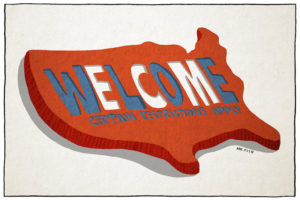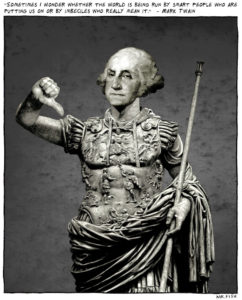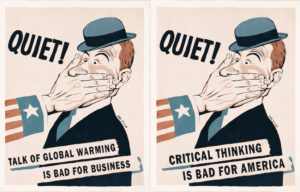The Peril and Promise of Interesting Times
If things get much more "interesting," we might have a collective nervous breakdown. But along with the anxiety, there's also a sense of rare opportunity -- a chance to emerge better than we were economically, politically and socially.“May you live in interesting times” is supposed to be an ancient Chinese curse, but I can’t find evidence that the saying is Chinese at all, much less that it’s ancient. One of the earliest reliable citations seems to be a 1950 short story by the British science-fiction author Eric Frank Russell, writing under the pen name Duncan H. Munro, who quotes the imprecation and then adds: “It isn’t a curse any more. It’s a blessing.”
That’s the glass-half-full way of seeing this extraordinary moment. As we enter the holiday season, it feels as if our nation is at a cusp, a brink, a verge. It’s true that if things get much more “interesting,” we might have a collective nervous breakdown. But along with the anxiety, there’s also a sense of rare opportunity — a chance to emerge better than we were economically, politically and socially.
Easy for you to say, many people would respond, and they’d have a point. I’ve been as mesmerized and freaked-out as anyone watching the stock market lose nearly half its value, then recover some ground, then oscillate so wildly that a 200-point gain or loss in the Dow is the new definition of a slow day. I’ve lost money (not that I had that much in the first place), but I haven’t been wiped out the way some people have. I don’t have an adjustable rate mortgage or a house that’s “underwater.” My employer is still in business.
I do have to learn to live with the new economic reality, though. I now know that there’s no law of economics that says real estate prices must always rise. I know that a house doesn’t make a very reliable bank, that “credit” isn’t an infinite pot of cheap money, and that having a little money in a savings account is better than Ambien for inducing a good night’s sleep.
More importantly, we’ve all learned that dealmaking for dealmaking’s sake — for decades the most highly compensated business activity in America — does not in fact create enduring wealth. There are straight-A seniors at Harvard and Princeton who planned to go into investment banking before the whole industry imploded. Now, maybe some of these brainiacs will go to work for the auto industry and save Detroit. Maybe some will invent, manufacture and market world-changing new “green technology.” Maybe some will join the Peace Corps. Maybe some will become teachers.
Politically, Americans are less divided than we’ve been since at least the Reagan era, perhaps longer. I know that many people would dispute that assertion, but I’ll defend it. Barack Obama’s victory margin, 53 percent to 46 percent, didn’t qualify as a popular vote landslide. But considered with other factors — Obama’s electoral vote haul, which was a landslide; the Democratic Party’s gains in both houses of Congress — the outcome was a clear mandate.
It’s meaningless to argue whether ours is a center-left or center-right polity; the midpoint of the nation’s political spectrum is, by definition, center-center. Ronald Reagan took office as the whole spectrum was moving to the right, and he pushed it further in that direction. Obama was elected as the spectrum was shifting back to the left, and he will try to give it a helping shove.
Whether you voted for Obama or not, it’s hard to watch this crisply orchestrated transition and doubt that the president-elect both understands and relishes the great possibility of this moment. That doesn’t mean he’ll succeed, and it certainly doesn’t mean he won’t make mistakes. It means he has big ideas and big plans — right or wrong — and I think most people know intuitively that this is no time for small.
The social transformation that has already begun is in many ways more definitive and profound than anything in the political or economic spheres. A conservative opinion-maker told me recently that she really, truly, with all her heart wanted John McCain to win — and then, when Obama and his family appeared on election night, “it all just went away.” It wasn’t that she forswore her candidate or her conservative philosophy — soon she’ll be writing elegant eviscerations of the new president’s policies. But she understood the epochal significance of the election of the first African-American president, and she was deeply moved.
In myriad ways that we’ll discover over the next four years, Obama’s election makes this a different country — “a more perfect union.” I, for one, feel blessed to live in such interesting times.
Eugene Robinson’s e-mail address is eugenerobinson(at)washpost.com.
© 2008, Washington Post Writers Group
Your support matters…Independent journalism is under threat and overshadowed by heavily funded mainstream media.
You can help level the playing field. Become a member.
Your tax-deductible contribution keeps us digging beneath the headlines to give you thought-provoking, investigative reporting and analysis that unearths what's really happening- without compromise.
Give today to support our courageous, independent journalists.





You need to be a supporter to comment.
There are currently no responses to this article.
Be the first to respond.